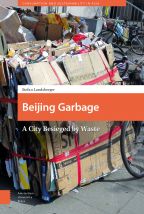Beijing Garbage: A City Besieged by Waste

The historical context of Beijing Garbage dates back to imperial Beijing (pre-1913), when there was no problem of abundant solid waste. In the thrifty periods that followed, recycling was presented as a patriotic duty. This started to change in the 1980s, when Chinese socialism became tinged with capitalism, and patriotic values were symbolized not by reuse, but by consumption. This growth of refuse, by approx. 10 per cent per year, outstrips any other country’s trajectory, leading to a situation where “China is now besieged by waste and threatens to be suffocated by it” (page 18).
While embedding this analysis within national-level policies, such as the burning of waste involved in converting waste to energy, Stefan Landsberger zeroes in on the Chinese capital to understand how it is dealing with municipal solid waste. He looks at different sets of actors:
• residents (many of whom feel helpless to stop the cycle of waste production)
• waste collectors (largely migrants from rural areas, who are increasingly being targeted by authorities)
• refurbishers (including those combining offline and online activities)
• environmental NGOs (which have delicate relationships with the government)
Landsberger presents some reasons for optimism. One is the relative success NGOs have had when training individuals to manage waste, compared to blunt orders or ineffective education campaigns. Another is the possible integration of informal waste recyclers, who are being driven out of Beijing and other cities, into formal waste collection programmes, though many recyclers have resisted such formalisation. Yet another is the possibility of integrating garbage separation into China’s social credit system, where citizens earn credits for socially beneficial behaviour. However, the social credit system has attracted its fair share of critics.
The complexity of balancing this constellation of people involved in producing, collecting or curbing waste suggests that reducing Beijing’s waste siege will be challenging. This is especially the case as Landsberger argues that all of the existing means of processing waste are insufficient, requiring a more preventive measure: reduced consumption.
Introduction available from: https://www.academia.edu/39042735/Beijing_Garbage_-_A_City_Besieged_by_W...
Further reading:
Byrne, John, Young-Doo Wang, Bo Shen and Xiuguo Li (1994), “Sustainable urban development strategies for China”, Environment and Urbanization Vol 6, No 1, pages 174¬–187, available at https://journals.sagepub.com/doi/pdf/10.1177/095624789400600115.
China Daily (2011), “Wang Jiuliang: besieged by waste”, YouTube, available at https://www.youtube.com/watch?v=IL5vMHcIJQk.
Li, Bingqin, Suvi Huikuri, Yongmei Zhang and Wenjiang Chen (2015), “Motivating intersectoral collaboration with the Hygienic City Campaign in Jingchang, China”, Environment and Urbanization Vol 27, No 1, pages 285–302, available at https://journals.sagepub.com/doi/full/10.1177/0956247814565567.
Book note prepared by Christine Ro
Search the Book notes database
Our Book notes database contains details and summaries of all the publications included in Book notes since 1993 - with details on how to obtain/download.
Use the search form above, or visit the Book notes landing page for more options and latest content.
For a searchable database for papers in Environment and Urbanization, go to http://eau.sagepub.com/

